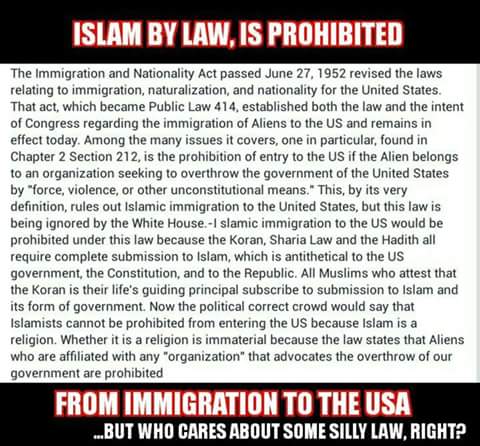
There’s so very, very much that could be said about this thing. But I’m short of time, so I’ll just make a couple of basic points:
1.
Islam is not an organization, any more than Protestantism is an organization.
There are various Protestant denominations (e.g., the United Methodist Church, the Church of England, the Assemblies of God, and so forth), and there are many hundreds, if not many thousands, of Protestant organizations (e.g., Samaritan’s Purse, Christian Research Ministries, Oral Roberts University, Wm. B. Eerdmans Publishing, and etc., and etc.), but there is no single organization called The Protestant Church.
Likewise, there are various Islamic organizations around the world (e.g., al-Azhar University, Islamic Relief Services, the American Islamic Forum for Democracy, al-Qa‘ida, the Muslim Students’ Association, the “Islamic State,” Muslims for America, and thousands of local mosques), but there is no Islamic “church” and there is no single Islamic organization of which all Muslims are members.
Accordingly, Muslims are absolutely not “by definition” barred from entering the United States because they belong to “an organization seeking to overthrow the government of the United States by ‘force, violence, or other unconstitutional means.'”
Muslims don’t necessarily belong to any particular “organization.”
But the problems with the statement above don’t end there.
2.
Plainly, not all Muslims seek to overthrow the government of the United States. I shared a platform last week in Phoenix, for example, with Dr. M. Zuhdi Jasser, a politically conservative physician — he was a Marco Rubio supporter, and now leans toward Ted Cruz — who also served for years as a lieutenant commander in the U.S. Navy.
At any given time, there are many Muslims serving in our armed forces, among our law enforcement personnel, and in other positions of public trust. And, overwhelmingly, they do so as well as their non-Muslim colleagues do.
For what it’s worth, when I visited the Indiana headquarters of the Islamic Society of North America (ISNA) just prior to the 2012 presidential election, the imam who had just led the Friday prayer and delivered the weekly sermon confided in me that he was intending to vote for Mitt Romney. Back when I was in graduate school, one of my fellow grad students was a very devout imam from Pakistan who was an enthusiastic fan of Ronald Reagan.
3.
Some views of Islam are definitely antithetical to the principles on which the United States of America are founded. But not all. And — I speak here as someone who regularly teaches courses on the Qur’an (in both English and Arabic) and on the Islamic faith — I flatly assert that there is nothing in Islam or its sacred text that is necessarily antagonistic to the Constitution of the United States or to the principles of American freedom. Everything depends upon interpretation. To paint with too broad a brush too broadly is to be deeply unjust.
4.
When the statement mentions Islam’s “form of government,” I’m curious to know precisely which “form of government” that is.
Are we talking about a caliphate? If so, precisely what is its nature to be? (Muslim thinkers have disagreed on this matter for centuries, profoundly and, often, brilliantly.) Or should it be a sultanate? Or an emirate? And what, if any, should be the place of a shura consultative council? Must the ruler be a lineal descendant of Imam ‘Ali, as the Shi‘a affirm? Or is that unimportant, as Sunnis have tended to think? And there are various forms of Shi‘ism — for example, Twelver, Zaydi, and Isma‘ili. Which of them will give us Islam’s “form of government.” (They all disagree.) And which legal school or interpretation of shari‘a provides the “form of government” taught by Islam? Would that be the Maliki school of jurisprudence? Or, perhaps, the Hanbali? Or the Hanafi? Or the Shafi‘i? Or the Ja‘fari? Or the now-extinct Zahiri?
And that’s just the tip of the iceberg.
There is no single “form of government” mandated by Islam.
When nonsense like that contained in the graphic above comes across your Facebook page, please don’t pass it on unless you have good cause to believe it accurate, just, and fair. Most such things that I’ve seen have been none of those things.
Posted from Salt Lake City, Utah










